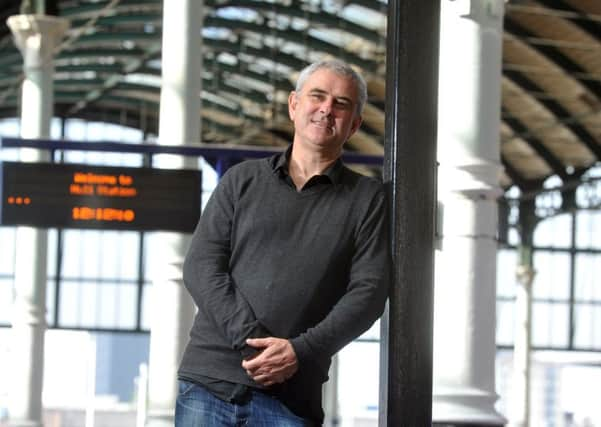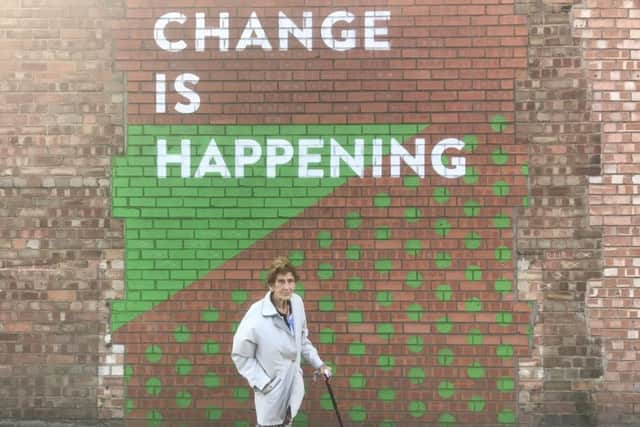Globe-trotting filmmaker turns his lens on home city of Hull


From Iraq to Japan to Syria, Sean McAllister’s documentaries have taken him all over the world. His BAFTA-nominated 2015 film, A Syrian Love Story, even landed him temporarily in jail after his cameras and anti-government subjects gained the attention of the police.
However, despite exploring various subjects across the globe, there is one place that McAllister has returned to time and time again: Hull.
Advertisement
Hide AdAdvertisement
Hide AdMcAllister was born and raised in the city and when he first picked up a camera, some of his earliest subjects were those around him, such as filming in the factory he worked in. Years later in 2002, he returned to make Hull’s Angel about a single woman’s quest to help asylum seekers in the city. In 2017 McAllister was invited to direct the opening ceremony of Hull City of Culture and during that period he made another film with Hull as its backdrop: A Northern Soul. The film has been selected to open this year’s Sheffield Doc/Fest on June 7, a prestigious spot that has previously brought high-profile names to it such as Michael Moore, Morgan Spurlock and Joan Rivers.


Recalling his upbringing in Hull, culture wasn’t something that McAllister felt was really there for him. “I never really questioned that word growing up and I think this film looks at that question: What is culture?” As a working class young man, this was something McAllister felt further removed from his grasp. “Art and culture always felt like it was for someone else. It felt like it was always for the middle classes. I was coming from the other side of that fence. When I got to film school and started being called an artist by people, it was almost a joke really because I’ve never seen myself as anything other than a former factory worker that ended up making films. Even now being called an artist is a bit weird.”
The particular vehicle that McAllister has chosen to explore this question of ‘what is culture?’ comes in the form of 42-year-old Steve Arnott. By day Steve is a warehouse worker struggling to keep afloat financially but by evening is a keen hip-hop artist who wishes to launch a Beats Bus mobile studio to take music and workshops to children in the further out parts of Hull, including some of the most disadvantaged areas. Once he secures a bus, McAllister follows him on his ups and downs to make it happen.
McAllister’s desire to make a film that explored the other side of the city during its cultural boom period came from being so closely involved. “Having done the opening show, I was asking myself what the heck all of this really meant for the city after years of austerity. I was kind of thinking, ‘how can people really engage with it?’ I wanted to go on a journey and exploration that was counter to the big thing I’d done in the city centre. Steve was going on another journey with his bus that was penetrating the real sticks of Hull, the parts that usually don’t get any attention.”
Advertisement
Hide AdAdvertisement
Hide AdHowever, behind the story of Steve mentoring kids and pushing hard to get his dream off the ground is another more politically-leaning film. Brexit acts as a loose backdrop to the film and McAllister feels Steve’s story of being an extremely hard working father spiralling further into debt is emblematic of escalating problems across the country. “My interest is socio-political,” he says. “So in a way City of Culture gave me the excuse to tell the story of Steve. It would have been a far less sexy pitch to the BBC if it was about a story of in-work poverty, which is a big problem in the UK at the moment. We have food banks and a rising homeless problem but we’ve now got a large number of people living beyond their means in debt but who are in jobs and working for low wages.”
The accurate presentation and interaction with working class culture and communities in Hull is clearly something McAllister feels strongly about. It too was central to his opening ceremony, a multimedia project that explored Hull’s history. “I was very conscious when doing the opening show of mediating the language of inclusion. A lot of people still think ‘that’s not for me’. So I was trying to find a way of doing an opening show that was accessible without being dumbed down. I’m very conscious of that in the documentaries I make too, whilst trying to look at interesting subjects and tackle issues, at the forefront of my films are very straightforward character portraits that people can immediately engage with. So when people turn on the telly and they see Steve, he’s a bloke that’s not very represented much by the mass media but he’s probably in seventy percent of the living rooms across Britain.”
McAllister says he still uses his Hull background and upbringing as a barometer for whether or not he thinks his films will connect with a broader audience. “I’ve never really lost touch with Hull. Even when I’ve been making films in war zones in Iraq or Syria, I’ve always been connected to Hull and my friends there, along with my parents. Hull is always home, even though I’ve been living in Brixton for 20 years. I always have my mates in Hull as my target audience so that whenever I make a bizarre film in some place like Japan, I’m trying to understand how I’m going to take the audience into this place and I always think of my close mates in Hull in that case. In a sense they’ve always travelled with me.”
He also wanted to present a face, story and ambition around contemporary working class culture in Hull that he feels has been cheapened and exploited by national television shows exploring a perceived rise in benefit culture. “Steve represents that face of the ordinary white working class that has been ruined in a way by this surge of negative media coverage in trying to cover benefit Britain. It’s shameless stereotyping of working class people, suggesting they are shirkers and they don’t want to work. Steve is far more representative of the working class people I know.”
Advertisement
Hide AdAdvertisement
Hide AdWhilst the film is loaded with a palpable sense of empathy, compassion and humanity, McAllister admits it’s not been easy exploring this side of people’s lives at times. “I grew up in the 1980s under Margaret Thatcher and it’s difficult to imagine saying that things could have gotten worse but social mobility has become more difficult for people like Steve. When I grew up, homeless people existed on the Strand in London; they weren’t on Newland Avenue in Hull. Lack of social mobility and the gap between the rich and the poor has just extended. So I found the situation much more difficult and depressing than I would have imagined it to be.”
However, despite some elements of the film exploring sad and desperate situations, it’s also one that comes with a sense of buoyant spirit that shows the power of community as well as individuals who are trying hard to move Hull away from its previously negative reputation.
“The film is about presenting a narrative of the city that is not the usual one put out there,” McAllister says. “To get out of that negative crappiest city in the UK perspective and to give it a different look.
“What we see in the film is not the Hull I grew up in, it’s now a very multicultural and multiracial city and within it, to me, Steve is an honourable example of the people I know up North.”
Sheffield Doc/Fest runs from June 7 to 12. For more details go to sheffdocfest.com